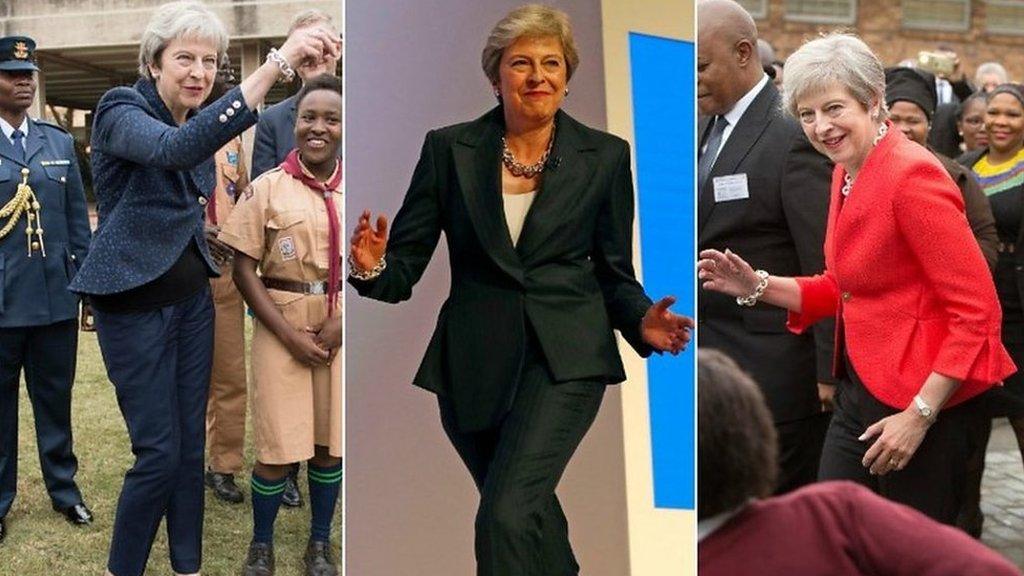Week ahead in Parliament
- Published
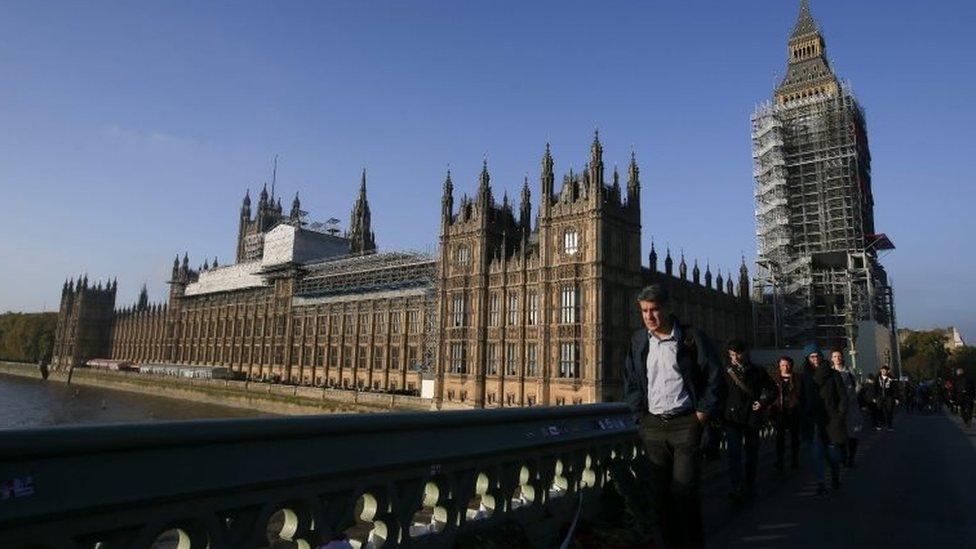
Call me a cynic, but the unbearable lightness of Monday's Commons business (and indeed the preceding Thursday's), with no votes due and hardly a select committee sitting, suggests an unofficial long weekend policy is now operating.
This is allowing MPs to turn up in Westminster on Tuesday and sidle off again on close of business on Wednesday - a policy which will continue at least until the arrival of a new prime minister and which may well last until the summer.
Whether honourable members use this time to hit the pavements of their constituency in preparation for an early election, or to catch up on a backlog of box sets, is a matter for individual conscience.
But in parliamentary terms, it might as well rain until September.
So what is cooking?
This week's biggest legislative moments (on climate change and divorce reform, with a new domestic abuse bill in the pipeline) look very much like the Theresa May legacy agenda - and they are significant measures, even if they're not likely to be particularly controversial.
Otherwise, the big moments will be provided by events, dear boy, in the shape of ministerial statements and urgent questions responding to whatever is happening beyond the walls of Westminster (hard to predict before they pop up), and by individual MPs and select committees pursuing their particular causes.
Monday 24 June
The Commons opens (14:30) with Education Questions, doubtless to be followed by the usual Monday crop of statements and urgent questions. This could include a report back from Mrs May on what will probably be her last EU heads of government summit.
Then MPs move on to the almost wholly uncontroversial Kew Gardens (Leases) Bill, which extends the leases for the famous gardens - and which will be polished off pretty rapidly.
More substantially, there will be a motion to approve a statutory instrument (SI) committing the UK to net zero carbon emissions by 2050, by way of an amendment to the target enshrined in the 2008 Climate Change Act.
While this is a big subject, it looks unlikely to result in a tight vote; the SI has cross party backing, so it should sail through - but expect a bit of flack from the Commons' climate change sceptics.
The day ends with an interesting-looking adjournment debate, led by the SNP's Lisa Cameron, on smart cities.
She wants to highlight the opportunities 5G internet technology will provide to make cities - and indeed towns and villages - cleaner, greener, more humane places.
This covers everything from smart traffic management, perhaps involving self-drive vehicles, to systems which can detect people becoming ill and automatically summon an ambulance, or detect a crime in progress and call the police.
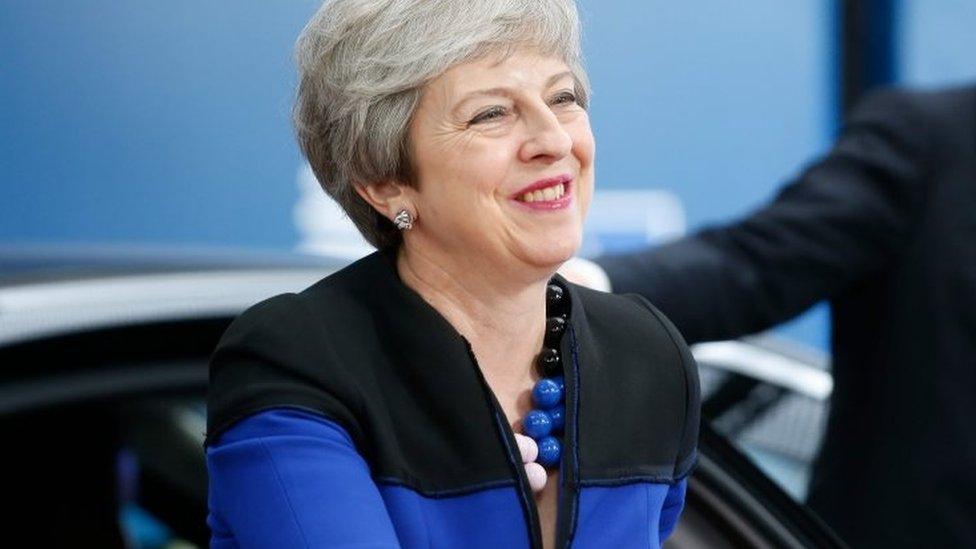
Theresa May could report back on what will probably be her last EU summit
Dr Cameron wants to highlight the initiatives already under way in many cities and make sure the UK seizes the opportunities they present.
Later in the day - and without debate, MPs will vote to confirm the date of their summer break - rising at the end of business on Thursday, 25 July, and returning on Tuesday, 3 September.
If anyone objects there will be a deferred vote on Wednesday.
In Westminster Hall (16:30) MPs debate e-petition 232684: "Ban the use of all non-recyclable and unsustainable food packaging - today the Earth is at a crisis point due to our plastic consumption, and as a result, people in the UK are more willing than ever to engage in recycling.
"Yet so much food packaging remains completely, frustratingly unrecyclable.
"Let's aim for the UK to lead the world with a 100% recycling rate."
The petition attracted 247,048 signatures.
On the committee corridor, there is a spooky silence - with virtually no meetings (see above).
In the Lords (14:30) the Conservative Lord Black of Brentwood will quiz ministers about the decline in the number of students taking music A-level.
The main legislation is the Courts and Tribunals (Online Procedures) Bill, where votes are likely on some Labour report stage amendments.
The bill creates a committee to design online rules for civil, family and tribunal jurisdictions.
But the Lords Constitution Committee has criticised the legislation as "unsatisfactory" for failing to acknowledge the right to a fair hearing, as protected by the European Convention on Human Rights, and Labour's Lord Beecham will push an amendment to ensure the proposed new committee includes a champion for the digitally excluded.
There will also be a short debate about ensuring boards of public bodies are fully representative of the society they are set up to serve.
Tuesday 25 June
Proceedings open with Tory Leadership contender and Foreign Secretary Jeremy Hunt in Foreign Office Questions (11:30), giving him a chance to flourish his credentials of Downing Street at the dispatch box, (or ward off hostile critics) for a prime-time hour.
The day's Ten Minute Rule Bill, from the Conservative, Eddie Hughes, aims to regulate ground rents on leasehold properties and provide a cap, as well as make property developers liable for the legal costs of leaseholders seeking to vary their ground rent contracts.
Then comes the second reading of the Divorce, Dissolution and Separation Bill, the biggest reform of divorce law since 1970.
It replaces the requirement to provide evidence of conduct or separation with a new requirement to provide a statement of irretrievable relationship breakdown.
The law aims to end the "blame game" of couples having to prove adultery or unreasonable behaviour, against one another - often to the detriment of children.
It also removes the possibility of contesting the decision to divorce, in response to the case of Owens vs Owens where the supreme court rejected a woman's appeal for divorce after her husband refused to agree a split.
The bill has cross-party support.

The second reading of the Divorce, Dissolution and Separation Bill will happen on Tuesday
The day ends with a more than usually interesting adjournment debate - the title is rather antiseptic:"Parental involvement in teaching in relation to the Equality Act 2010".
But this is the Labour MP, Roger Godsiff, who criticised LGBT lessons in primary schools as not "age appropriate" and sided with parents demonstrating against them.
This led to calls for him to lose the Labour whip - so will this debate see him doubling down or recanting?
In Westminster Hall (9:30) Labour MP Debbie Abrahams leads a debate on improving the lives of people living with dementia, to mark Dementia Action Week.
One reason for the debate is the increase in people who are living with dementia - 850,000 people rising to one million by 2021.
Dementia has overtaken cancer and heart disease as the leading cause of death in this country.
The aim of the debate is to highlight the issues around quality and sustainable care for people living with dementia in advance of the next government spending review.
Other subjects for debate include the Environment Food and Rural Affairs Committee chairman, Neil Parish, on the gambling levy from online gambling and racing greyhounds (11:00).
He wants bookmakers who profit from greyhound racing to contribute to the welfare of the dogs - it is thought thousands are unaccounted for each year and that euthanasia is routine.
Labour's Emma Lewell-Buck has a debate calling for the abolition of child imprisonment (14:30); the Conservative, Giles Watling, (16:30) wants the government to take the power after Brexit to vary beer duty rates for on-trade sales of beer in pubs from those applied to off-trade sales at larger retailers.
This could be used to lower the rate of beer duty in pubs compared to supermarkets, so protecting pubs as community assets.
Finally, Labour's Tonia Antoniazzi discusses the health effects of electromagnetic fields - she has asked a series of written questions on this issue and been assured by the government that there is no convincing evidence that electromagnetic field exposures below guideline levels cause health effects in either adults or children.
On the committee corridor the big event is the Digital Culture Media and Sport committee hearing (10:30) with senior executives from ITV (but not Jeremy Kyle) on reality TV and the duty of care to participants in reality shows, including the now-axed Jeremy Kyle Show and Love Island.
The inquiry will invite a range of former participants and programme makers to give evidence over the coming months.
A couple of other notable hearings - the Defence Committee (11:30) looks at UK defence and the Far East, with expert witnesses from an assortment of think tanks.
Meanwhile, the committee on standards (10:00) examines possible reforms to the system of sanctions for breaches of the rules set out in the code of conduct for members of Parliament - are there sufficient powers to punish MPs who break the rules?
The committee will quiz Ken Gall, trade union side president for the House of Commons, and Dave Penman, the general secretary of the top civil servants' union, the First Division Association.
There is some quite high-powered stuff here: how far does the House have the power to delegate the sanctioning of MPs to, say, the commissioner for standards? Should there be a right of appeal, and if so, to whom? Should any sanctions remain confidential?
In the Lords (14:30), questions to ministers include the crossbench or independent peer Lord Harries of Pentregarth on ash dieback, and the refugee campaigner Lord Dubs asking about the number of unaccompanied child refugees who have entered the UK since beginning of 2016 under section 67 of the Immigration Act 2016 or the provisions of the Dublin III Regulation.
Then peers move on to the second reading of the Birmingham Commonwealth Games Bill (as presaged in this blog a few weeks ago).
This type of legislation has become an essential preliminary to any major sporting event - the games will be held in 2022 - it includes measures to prohibit unauthorised sale of games tickets, protect commercial rights and support transport flow to the various venues
Wednesday 26 June
The Commons day opens (11:30) with half an hour of Welsh questions before Prime Minister's Question Time, at 12:00.
The day's Ten Minute Rule Bill, from Labour's Christian Matheson, is on football regulation - he's trying to create an outlet for the redress of grievances for football supporters where their clubs are being grossly mismanaged.
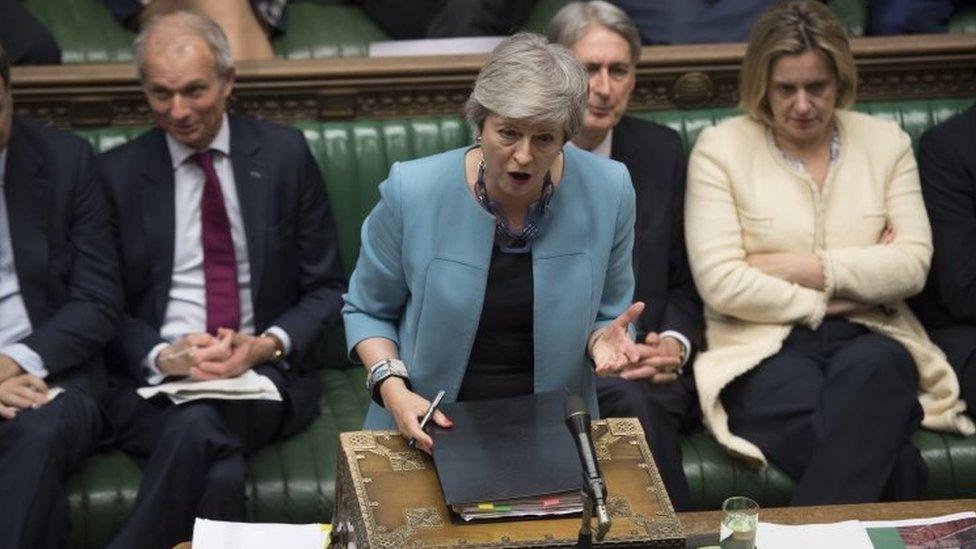
Theresa May is at PMQs at noon
At the moment the FA devolves matters of "stewardship" to the appropriate league, but the leagues are membership organisations, made up of clubs, and he believes the clubs will not change their rules to allow more scrutiny of themselves.
He wants the FA to take charge on behalf of fans where a club is being used as a cash cow or being driven into the ground.
His bill will provide an independent regulator with the powers to forensically investigate clubs and directors where there is evidence of gross mismanagement - as opposed to bad management.
The main debates are an SNP Opposition Day motion on immigration, followed by a general debate to mark Armed Forces Day.
In Westminster Hall the opening debate led by the Conservative Sir Robert Syms is on the tax treatment of NHS pensions (9:30).
He says new rules on the taxation of pension pots are penalising doctors and other key NHS staff, to the point where they are doing the minimum work required by their contracts, in order to avoid massive tax bills, which in turn is causing huge problems for the delivery of NHS services.
He quotes a BMA survey of 350 GPs, which found that nearly half of them had received tax bills of £18,000 or more, because of the new rules. He will be asking a treasury minister to find some remedy that will allow highly trained staff to return to normal working without facing further tax penalties.
Other debates include government policy on heated tobacco (11:00) Conservative former cabinet minister David Jones discusses a new nicotine delivery system, where a small tobacco stick is heated electronically, rather than burned; the replacement of EU structural funds for least developed regions (14:30) and finally the Conservative Anne-Marie Trevelyan on puffin habitats.
On the committee corridor (9:15) the Privileges Committee looks at the exercise and enforcement of the powers of select committees, particularly their ability to summon witnesses.
Clerk of Commons, Dr John Benger, heads the witness list.
And the Public Accounts Committee (14:30) investigates the Help to Buy scheme, following up on a recent National Audit Office report which found that three-fifths of participants could have bought a property without the support of Help to Buy.
There's a whole series of concerns around the scheme, not least that it appears to provide financial products outside the normal regulatory system, and these products can end up locking customers into mortgages with punitive interest rates.
In the Lords (15:00) questions to ministers include Labour's Lord Faulkner of Worcester asking about the increase in metal theft on the railway network, from construction sites and from churches.
Then peers rattle through a series of uncontroversial legislative odds and ends - the third reading of the Census (Return Particulars and Removal of Penalties) Bill and then the second reading of the National Insurance Contributions (Termination Awards and Sporting Testimonials) Bill, followed by some orders and regulations.
The first is the zero carbon target SI on the 2008 Climate Change Act, which is due to be approved by MPs on Monday.
There's a regret motion from the Labour Peer Lord Grantchester, which supports achieving net-zero carbon emissions by 2050, but regrets that the government have given little detail of how the emissions target will be met and have not introduced regulations to include greenhouse gases from aviation, or shipping in the emissions target.
This is likely to be pushed to a vote. Further SIs follow, on animal welfare, consumer rights, safeguarding vulnerable groups and victims and witnesses.
Thursday 26 June
The Commons opens (9:30) with Brexit Questions, followed by Business Questions to the Leader of the House, Mel Stride.
The main debates are on two subjects selected by the Backbench Business Committee - the contribution of cooperatives and mutuals to the economy, led by former chairman of the Co-operative Party Gareth Thomas and the Conservative, Steve Baker.
The motion calls for a government review to identify how it can help the cooperative sector.
The second debate, led by Work and Pensions Committee chairman Frank Field, is on the Children's Future Food report, which looked at the extent of child hunger in the UK and called for a new, independent children's food watchdog to lead the charge on tackling children's food insecurity.
In Westminster Hall Conservative MP Robert Courts leads a debate on Combat Air Strategy progress and next steps - one of a series of debates he has pushed for, looking at different aspects of Britain's future defence posture.
Meanwhile all is silent on the committee corridor.
In the Lords (11:00) the main debates are on subjects chosen by Lib Dem peers.
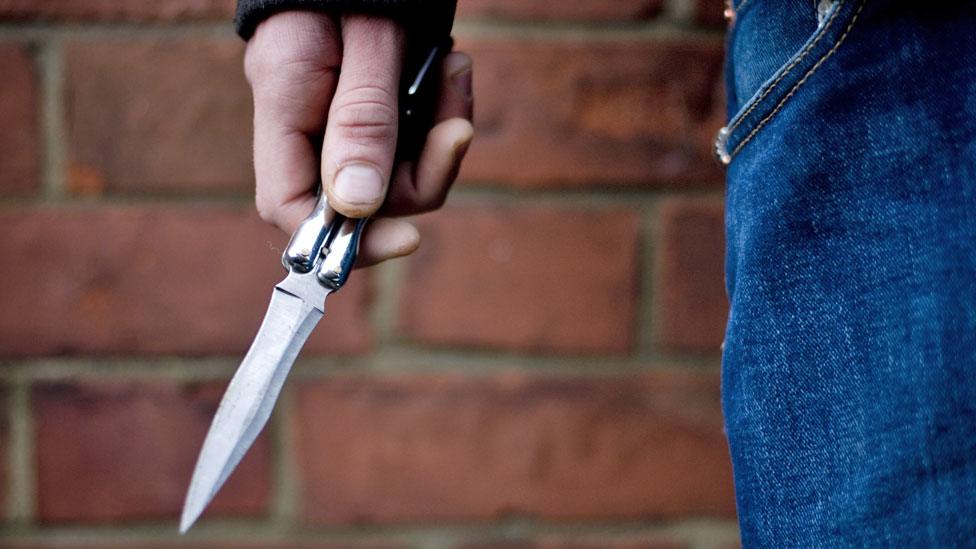
There will be a debate on the impact of government policy on knife crime
The first is on the impact of government policy on knife crime, led by former police officer Lord Paddick.
He will argue that the recent spate of murders has focused public attention on youth violence generally and knife crime in particular, and revealed the lack of a coherent, comprehensive strategy to tackle knife crime.
Lord Paddick regards the current serious violence strategy as "a collection of unconnected initiatives and separate pots of funding that have been indiscriminately thrown at the problem over recent years".
That's followed by a debate on the report on the Financial Conduct Authority's further investigative steps in relation to RBS's Global Restructuring Group (GRG) and on the impact of recent benefit changes on vulnerable people.
Neither House sits on Friday.
- Published18 July 2019
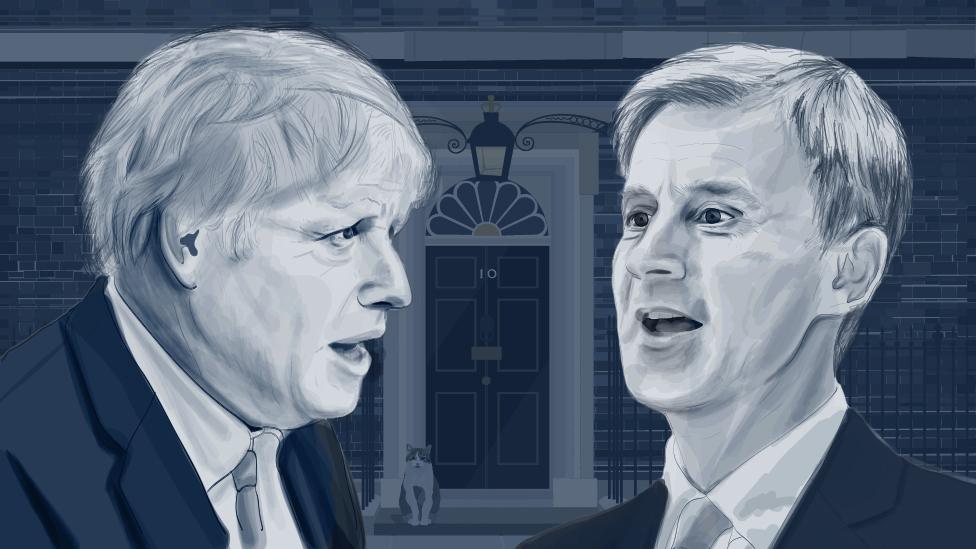
- Published23 July 2019
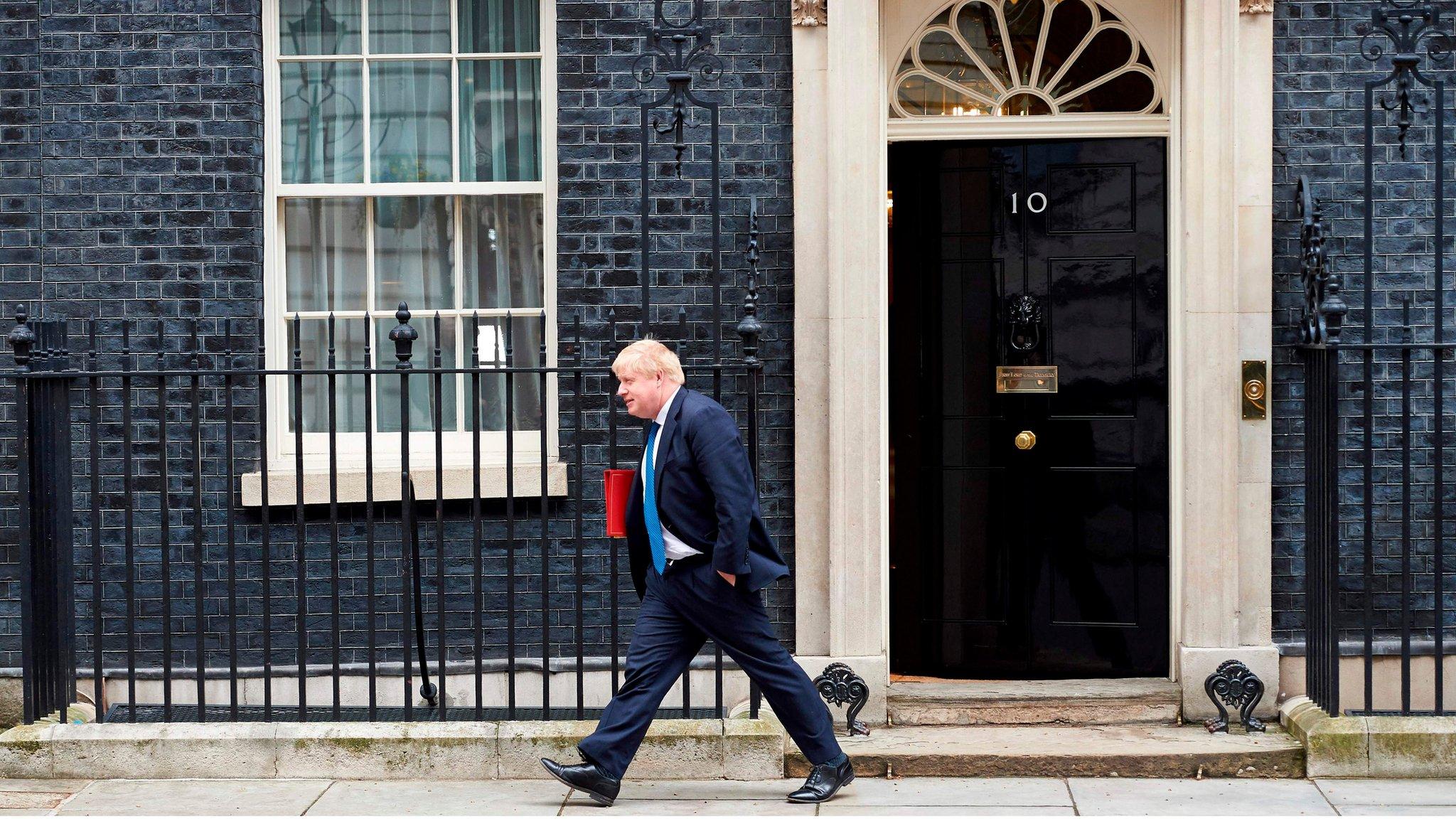
- Published7 June 2019
